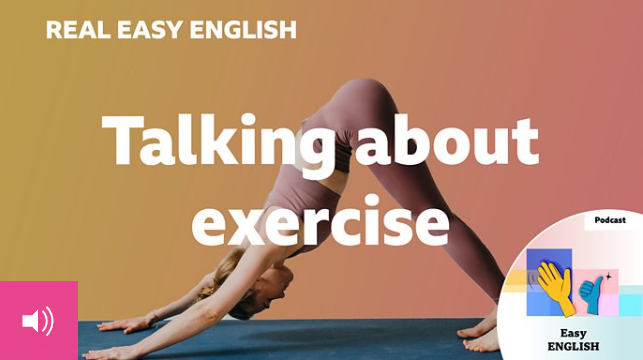Introduction
Neil and Georgie have a real conversation in easy English about their hobbies. Learn to talk about your past and future plans.
Vocabulary
spare time and free time
the time when we’re not working and we don’t have anything we need to do
last (weekend)
used to talk about past plans
next (weekend)
used to talk about future plans
take up
start a new sport or hobby for the first time
Transcript
Georgie
Hello and welcome to Real easy English. I’m Georgie.
Neil
And I’m Neil. In this podcast we have real conversations in easy English to help you improve your language skills.
Georgie
If you want to read along to the podcast you can find a text version at bbclearningenglish.com.
Neil
Hi, Georgie. How are you doing?
Georgie
I’m doing OK thanks, Neil. How are you?
Neil
I’m fine.
Georgie
What are we talking about this week, Neil?
Neil
Today we’re talking about hobbies. We’ll talk about the sports we play in our spare time.
Georgie
OK, great! Can you explain what you mean by spare time?
Neil
Well, spare time means the time when we’re not working and we don’t have anything that we need to do.
Georgie
Yes. And we can also use the phrase free time, which means the same thing.
OK, so, Neil, do you play any sports in your free time?
Neil
Well, I do exercise, so I go running. That’s not really a sport. I help my son training when he plays cricket, so that’s kind of playing sport.
Georgie
Very good.
Neil
And how about you, Georgie. Do you play sports?
Georgie
I also don’t play a sport, but I do like running and I also do yoga as well.
Neil
Ah yoga? When do you do yoga?
Georgie
I usually do it during the week. But last weekend I did yoga as well. I like doing yoga at the end of a stressful week because I feel it makes me relaxed.
So, Neil, you said you like running. When do you like to go running?
Neil
I go running at lunchtime when I’m working from home. So it’s nice to do some exercise in the middle of the day and go for a run and then feel alive again in the afternoon.
Georgie
Why else do you like running?
Neil
Actually, I don’t like running! I don’t like the actual running, but after I go running, I feel great, always. And I think I should go running more, but I never want to.
Georgie
Yes, I understand that feeling as well.
Neil
When did you last go for a run, Georgie?
Georgie
Actually, I went running last weekend. It was a really sunny day and it felt great.
Neil
So, Georgie, do you have any plans to go for a run or maybe do yoga this weekend?
Georgie
Not this weekend, but next weekend I have plans to go running with my friends.
Neil
Oh, wow! Do you talk and run at the same time?
Georgie
Absolutely not.
Neil
Good because that’s like extra exercise.
Georgie
That is too difficult, Neil. I can’t run and talk to my friends!
OK, Neil. So, we know that you go running and you like cricket. But are there any new sports that you’d like to try?
Neil
Well, Georgie, you do yoga. I’d like to take up yoga. But I have tried it in the past and it was just too boring.
Georgie
Yoga is not boring. It’s wonderful! Neil could you explain the verb take up that you just used?
Neil
Yeah, we take up something, it means that we try something for the first time, a new hobby or a new habit, I suppose. So, you can take up a sport or take up learning a new instrument.
Georgie
I’d like to take up painting, I think. I think painting is a really nice way to boost your creativity.
Neil
Let’s recap the vocabulary we learned during the conversation. We had next to talk about a future plan. Like next weekend.
Georgie
We used last to talk about a past plan. Like last weekend, last month, last week. It’s usually the most recent.
Neil
And we had take up, which means start a new hobby.
Georgie
Yes. And I’m going to take up painting which is exciting.
Georgie
Thanks for listening to Real Easy English. Visit our website for more activities and courses to help you with your English: bbclearningenglish.com.
Next time. We’ll talk about social media.
Neil
See you then, goodbye.
Georgie
Bye!
